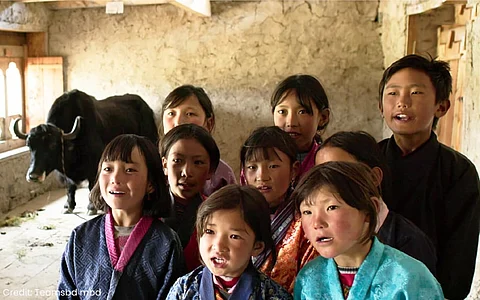
- In-Depth Stories
- Web Stories
- Reviews
- News
- FC Lists
- Interviews
- Features
- FC SpecialsFC Specials

I had never watched a Bhutanese film before Lunana: A Yak in the Classroom. To be honest, I had never even heard of any. But then, this movie was different. Along with winning numerous other accolades, it became the first Bhutanese film to be nominated for Best International Feature Film at the Oscars this year. Let alone be nominated, when the director of the film, Pawo Choyning Dorji, had tried to submit it on the Academy website, Bhutan wasn't even an option and Dzongkha, the national language, didn't exist on the language drop-down list! For a movie to have such a special journey and create nothing short of history was more than enough to pique my interest and make me watch this earnest piece of cinema. And I am so glad I did!
The first thing that strikes you about Lunana: A Yak in the Classroom is how charmingly simple, yet effective the film is in delivering its message; it has no long speeches or melodrama. Instead, it focuses on showing us the kind of world we seem to have lost touch with over the years. The urban competitive lifestyle that we are leading right now makes one appreciate the calm and relaxed vibe of Lunana instantly. That being said, it couldn't have been an easy task, by any standard, to shoot in such a remote village. In one of his interviews, Pawo Choyning Dorji mentioned that they had to reach there by an eight-day trek on foot and that they were dependent on solar batteries and chargers to shoot. It was like going to another world beyond civilization altogether. But, considering how well the film has been received and more importantly, how much it has made people reflect and feel, their painstaking efforts seem to be worth it.
The film's story centers around Ugyen, a reluctant young teacher who doesn't enjoy teaching as such. Instead, he wants to shift to Australia to become a singer. When he is sent to the remotest school in the world to teach, he abhors the idea so much that he decides to quit as soon as possible. The first few days of his stay at Lunana are visibly challenging (due to the drastic changes in the weather and his lifestyle) but he slowly warms up to the place and the people living there. On his first day in school, he asks the nine students to introduce themselves and say what they would like to become in the future. One of the students says that he would like to become a teacher as teachers have the ability to 'touch the future'. This makes Ugyen stop and think for a moment: even though he was a teacher, he had never thought about himself like that and had never even had such deep respect and regard for his profession.
The truth is for someone like Ugyen, who had grown up in Thimphu, the capital of Bhutan, having a teacher or being a teacher was something regular and commonplace, so much so that one subconsciously starts taking a profession like that for granted and forgets the whole essence of it. What that student said with such innocence made him (and us) realise the value of a teacher all over again.
Moreover, the focus of education these days is often on fulfilling our worldly needs. This movie resembles a gentle teacher in a way — it makes us appreciate the basics that truly matter, such as the unparalleled joy of learning, of being in a place where we can make a difference and touch lives in our own little ways.
Towards the end, the village leader points out how Bhutan is considered to be one of the happiest countries and yet, the Bhutanese youth, just like Ugyen, constantly wish to be somewhere else, looking for happiness. In one of his interviews, Pawo Choyning Dorji mentioned that he got to travel extensively around the world because his father was a diplomat and that this led to him developing a superiority complex by the time he was eighteen. It is only when he travelled around Bhutan, met genuinely interesting people and heard their stories that he realised how beautiful his country was and how no matter where he goes, he is a Bhutanese at the end of the day. The director has tried to portray this earlier version of his father and his gradual transformation through the character of Ugyen in the film. This young, hip, modern guy who dreams of moving to Australia eventually finds a sense of belonging in the farthest corner of Bhutan, his own country.
There is a reason why they say 'no matter where you go, never forget where you came from'. The uncomplicated life that you grew up with, the little traditions you enjoy with family, the comforting aroma of a home-cooked meal and the familiar songs of childhood will give you contentment like nowhere else. Lunana: A Yak in the Classroom is about all these and much more. At the end, when Ugyen starts singing 'Yak Lebi Lhadar', the local Yak song of Lunana amidst foreigners, you know the song has taken him where his heart belongs. He is home!